2022 State Energy Conference Connects the Clean Energy Community in North Carolina
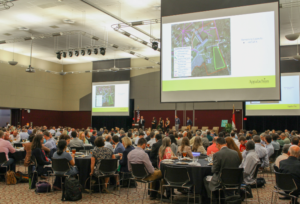 On April 26 and 27, over 700 clean energy professionals joined the NC Clean Energy Technology Center (NCCETC) for the 2022 State Energy Conference of North Carolina (SEC), which returned in-person in Raleigh, NC for the first time since 2019.
On April 26 and 27, over 700 clean energy professionals joined the NC Clean Energy Technology Center (NCCETC) for the 2022 State Energy Conference of North Carolina (SEC), which returned in-person in Raleigh, NC for the first time since 2019.
SEC had over 30 sessions to choose from in six different tracks: Residential Homes/Clean Transportation, Commercial & Industrial Buildings, Governmental & Institutional Buildings, Renewable Energy, Utilities & Infrastructure, and Energy Innovation & Deployment. Attendees came from a variety of backgrounds, including state and local government, non-profits, startups, academia and corporate organizations – joined under the SEC’s theme: “Connecting North Carolina’s Diverse Energy Economy.”
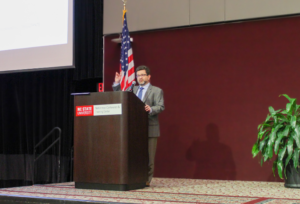
Attendees were able to be a part of the clean energy discussion over two days of live sessions where they listened to and connected with industry leaders while sharing their own ideas about North Carolina energy’s present and future. In each SEC session, participants asked questions both in-person and virtually on topics like electric and alternative fuel vehicles, offshore wind, House Bill 951, solar energy, net metering and more.
“There’s a lot going on in energy these days,” said Steve Kalland, Executive Director of NCCETC, as he kicked off SEC on Tuesday morning. Kalland noted that recent legislation in North Carolina like House Bill 951, Executive Order (EO) 951, EO 218, EO 246, and more are driving forward clean energy technologies and solutions throughout the state.
NORTH CAROLINA ENERGY POLICY 2022: WHAT’S IN PLAY?
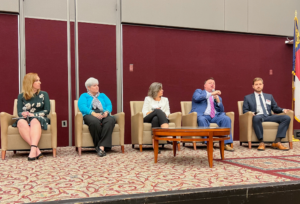 On the first day, Betsy McCorkle, a partner for Kairos Government Affairs, moderated the plenary panel “North Carolina Energy Policy 2022: What’s in Play?” which featured Tyler Norris, Head of Development and Policy, Cypress Creek Renewables; Nelle Hotchkiss, Senior Vice President and COO, Association Services, North Carolina’s Electric Cooperatives (NCEC); Dionne Delli-Gatti, State Clean Energy Director, North Carolina Governor’s Office; and Representative Jason Saine, North Carolina General Assembly. This diverse panel of energy stakeholders came together to discuss how they are working together to advance clean energy initiatives tailored to the different needs of communities across the state.
On the first day, Betsy McCorkle, a partner for Kairos Government Affairs, moderated the plenary panel “North Carolina Energy Policy 2022: What’s in Play?” which featured Tyler Norris, Head of Development and Policy, Cypress Creek Renewables; Nelle Hotchkiss, Senior Vice President and COO, Association Services, North Carolina’s Electric Cooperatives (NCEC); Dionne Delli-Gatti, State Clean Energy Director, North Carolina Governor’s Office; and Representative Jason Saine, North Carolina General Assembly. This diverse panel of energy stakeholders came together to discuss how they are working together to advance clean energy initiatives tailored to the different needs of communities across the state.
Dionne Delli-Gatti’s work as the State Clean Energy Director supports administrative efforts to promote clean energy in North Carolina including negotiating energy legislation, advancing regulatory efforts, implementing EO 80 and 246, and more.
Delli-Gatti noted that continuing advancement of clean energy technologies has forced recent bills to be written with flexibility in mind. “One of the biggest benefits of [House Bill] 951 is that we didn’t make it prescriptive- we made it flexible,” Delli-Gatti said.
Governor Roy Cooper signed House Bill (HB) 951: Energy Solutions for North Carolina in October of 2021. The bill sets guidelines for rulemaking and regulatory reform for energy policy over the next decade. HB 951 requires the NC Utilities Commission to take “all reasonable steps” to achieve 70 percent carbon emissions reductions from 2005 levels by 2030 and achieve carbon neutrality by 2050.
What’s on the Horizon for Rural Communities?
The panel discussed what North Carolina is doing to ensure the clean energy economy is accessible and reliable for all communities, especially those underrepresented and underserved in rural areas. “Rural North Carolina is a part of this conversation and actually really active in this space,” said Nelle Hotchkiss.
NCEC has assisted members and customers to bring renewable energy solutions like community solar, electric vehicle charging infrastructure, battery storage and more so that all North Carolinians can participate in the energy transition. Hotchkiss noted that ‘you can chase a lot of rabbits’, but the best way for North Carolina to remain a competitive state in the clean energy industry is to chase the right rabbits with reliability and affordability in mind.
“It’s a really exciting time and there’s so much opportunity,” explained Delli-Gatti, “but we need to be thoughtful so that we’re filling the gaps.” Delli-Gatti said investing in places that are less market driven is key for rural areas of the state prone to hurricanes in order to secure charging stations along evacuation routes with resiliency in mind.
KEYNOTE SPEAKERS
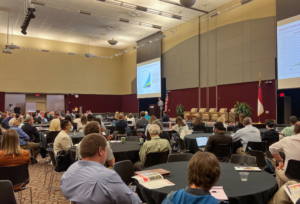 Will Giese, Southeast Regional Director for the Solar Energy Industries Association (SEIA), delivered opening remarks for the SEC on Tuesday morning. Giese said the expanding solar industry represents a major opportunity for North Carolina. According to SEIA, North Carolina currently ranks fourth in the United States for solar and employs over 6,000 people.
Will Giese, Southeast Regional Director for the Solar Energy Industries Association (SEIA), delivered opening remarks for the SEC on Tuesday morning. Giese said the expanding solar industry represents a major opportunity for North Carolina. According to SEIA, North Carolina currently ranks fourth in the United States for solar and employs over 6,000 people.
“For SEIA, building competitive markets is the primary driver for renewable energy deployment in the United States,” Giese explained. One particular area of interest for SEIA to drive a more competitive market are strategies for incentivizing domestic manufacturing of solar modules as the United States currently imports the majority of solar modules from outside the country. Giese said, “Domestic modules account for less than 25 percent of demand.”
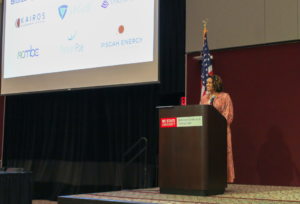 Many global companies have already invested in North Carolina, and, according to the NC Department of Commerce’s Secretary of Commerce Machelle Baker Sanders, one key factor attracting big business like Apple, VinFast and Toyota is the state’s commitment to clean energy and the clean energy economy.
Many global companies have already invested in North Carolina, and, according to the NC Department of Commerce’s Secretary of Commerce Machelle Baker Sanders, one key factor attracting big business like Apple, VinFast and Toyota is the state’s commitment to clean energy and the clean energy economy.
Machelle Baker Sanders, Secretary of Commerce at the NC Department of Commerce, also discussed how valuable clean energy could be for North Carolina’s economy. Sanders said her mission is to ensure North Carolina’s diverse economy is an inclusive one that works for all people. Part of this will be to bring manufacturers into the state, Sanders explained, especially in developing industries like offshore wind.
Currently, the Department of Commerce has been working with NCCETC and others to find ways to advance offshore wind energy projects in the state, with a focus on economic development and job creation. The North Carolina Taskforce for Offshore Wind Economic Reduction Strategies, or NC TOWERS, will be guiding Governor Cooper and other policymakers throughout the state to foster a thriving offshore wind workforce and business community.
“The task force is working with commerce staff to identify and recommend strategies to grow the state’s supply chain to grow the state’s footprint when it comes to offshore wind as well as clean energy,” said Sanders.
The Energy Stories We’re Talking about in 2022
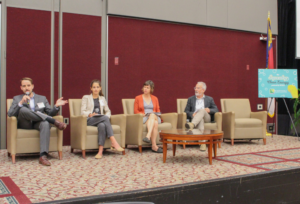 Workforce development was revisited during the afternoon keynote moderated by Matt Abele from the NC Sustainable Energy Association. For the second year, conference attendees were able to see a live recording of the Squeaky Clean Energy Podcast tackling regional and national energy stories that are set to impact clean energy over the coming years. “Squeaky Clean Energy Podcast Live: The Energy Stories We’re Talking About in 2022” featured David Boraks, Climate Change Veteran Journalist, WFAE; Elizabeth Ouzts, Reporter, Energy News Network; and Catherine Morehouse, Federal Energy Reporter, POLITICO.
Workforce development was revisited during the afternoon keynote moderated by Matt Abele from the NC Sustainable Energy Association. For the second year, conference attendees were able to see a live recording of the Squeaky Clean Energy Podcast tackling regional and national energy stories that are set to impact clean energy over the coming years. “Squeaky Clean Energy Podcast Live: The Energy Stories We’re Talking About in 2022” featured David Boraks, Climate Change Veteran Journalist, WFAE; Elizabeth Ouzts, Reporter, Energy News Network; and Catherine Morehouse, Federal Energy Reporter, POLITICO.
Elizabeth Outz also highlighted the potential for developing a skilled solar workforce in eastern North Carolina. With solar farms already operating and more in development across these rural areas, solar training programs in community colleges can give citizens who live the skills to succeed in a clean energy career. In Halifax County, a local high school partnered with a community college to allow high school students to benefit from renewable energy technologies training, said Outz.
David Boraks emphasized sustainability efforts on the city and municipal levels, like adopting sustainability goals and committing to carbon neutrality. Boraks singled out one town in particular- “Boone had an opportunity this year to do something that no other municipality in North Carolina has done and that is transition their electric grid to completely renewable.”
The Relationship of Environmental, Social and Governance (ESG) to Clean Energy Today
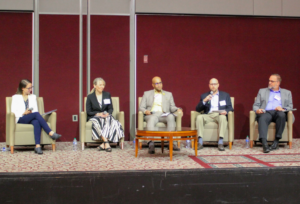 A diverse panel of energy professionals came together for the keynote plenary “The Relationship of Environmental, Social and Governance (ESG) to Clean Energy Today.” Moderated by Deb Wojcik, Executive Director of the Research Triangle CleanTech Cluster, the panel also featured Erik Lensch, Chief Executive Officer, Leyline Renewable Capital, LLC; Michal Shepard, Director of Maintenance, Energy and Engineering, Harris Teeter; Ron Wages, Director, Diversity and Inclusion, Duke Energy Corporation; and Maurie Lawrence, Vice President Sustainability, Associate General Counsel, Milliken and Company.
A diverse panel of energy professionals came together for the keynote plenary “The Relationship of Environmental, Social and Governance (ESG) to Clean Energy Today.” Moderated by Deb Wojcik, Executive Director of the Research Triangle CleanTech Cluster, the panel also featured Erik Lensch, Chief Executive Officer, Leyline Renewable Capital, LLC; Michal Shepard, Director of Maintenance, Energy and Engineering, Harris Teeter; Ron Wages, Director, Diversity and Inclusion, Duke Energy Corporation; and Maurie Lawrence, Vice President Sustainability, Associate General Counsel, Milliken and Company.
As Erik Lensch explained, ESG is an approach to evaluating the extent to which a corporation works on behalf of social goals that go beyond just making a profit. Typically, goals advocated within ESG include goals to address environmental concerns such as sustainability and the climate crisis, goals to address social concerns like diversity and human rights, and goals to address corporate governance concerns including compensation, employee relations and management structure.
At Leyline Renewable Capital, LLC they approach the social aspect of ESG through a lens of diversity, equity and inclusion both internally and externally when choosing where to invest capital in order to help uplift under-represented communities. “We’re being proactive in how we’re investing capital by, for example, looking for projects that support low-income housing communities, or that can support developers run by minority or women-owned companies,” said Lensch.
Duke Energy has the unique opportunity to have a significant impact through ESG goals, Ron Wages noted. “Since 2010, we’ve retired 56 [coal facilities]- that’s 7500 MegaWatts,” Wages said. He reports Duke Energy’s carbon emissions are down 44 percent from 2005 levels.
During the second day of SEC, conference attendees came together to recognize new and existing SolSmart Communities across North and South Carolina who have worked to make it faster, easier and more affordable to go solar in their jurisdictions. There are now 19 communities in the Carolinas with SolSmart designation.
Freeing Energy with Bill Nussey
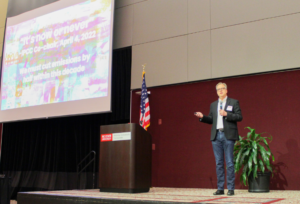 Bill Nussey, CEO and Founder of Freeing Energy, joined the SEC for a keynote on his recently released book Freeing Energy: How Innovators Are Using Local-scale Solar and Batteries to Disrupt the Global Energy Industry from the Outside In. Nussey has been a tech CEO for 25 years, but he recently left the tech industry for clean energy and founded the Freeing Energy Project with the mission to educate and inspire innovators to join forces and accelerate the shift to renewables through the smart adoption of decentralized generation of electricity.
Bill Nussey, CEO and Founder of Freeing Energy, joined the SEC for a keynote on his recently released book Freeing Energy: How Innovators Are Using Local-scale Solar and Batteries to Disrupt the Global Energy Industry from the Outside In. Nussey has been a tech CEO for 25 years, but he recently left the tech industry for clean energy and founded the Freeing Energy Project with the mission to educate and inspire innovators to join forces and accelerate the shift to renewables through the smart adoption of decentralized generation of electricity.
Freeing Energy is a deeply researched, actionable guide for anyone that cares about the future of energy—from startups, policymakers, investors, and utility leaders to the families and communities that want cleaner, cheaper energy today. The book offers a new and faster path towards a clean energy future that is more reliable, more equitable and cheaper.
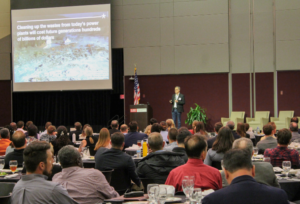 According to Nussey, the clean energy industry is on the precipice of a major disruption- small-scale “local energy” systems are challenging every assumption about our centuries-old, centralized electric grid. These smaller systems are based on fast-moving technologies, not fuels, making them more competitive and capable of deep disruption.
According to Nussey, the clean energy industry is on the precipice of a major disruption- small-scale “local energy” systems are challenging every assumption about our centuries-old, centralized electric grid. These smaller systems are based on fast-moving technologies, not fuels, making them more competitive and capable of deep disruption.
Nussey sees local energy systems including community solar, rooftop solar, microgrids and batteries as critical to the energy transition. During his keynote, Nussey characterized these local energy solutions as faster, cheaper, more resilient, more equitable and more innovative than traditional energy.
SEC ON-DEMAND
New for the 2022 State Energy Conference, attendees could choose the best attendance option for them during registration. Whichever option attendees chose, they were able to prioritize live sessions during the conference and catch up on the rest on-demand with access to recordings of all conference sessions available for two weeks after SEC ended.
Conference attendees were also able to watch five pre-recorded Hot Topic Sessions. Hot Topic sessions are 45-minute deep dives into specific energy-related topics led by experts in the industry. This year’s sessions focused on topics from electric vehicle charging solutions to clean energy sector workforce development and more.
To access hours of content from industry experts in six tracks and more than 30 sessions, register online now. Save the date for the 2023 State Energy Conference, April 25 – 26, 2023! Learn more about the State Energy Conference at www.ncenergyconference.com/.